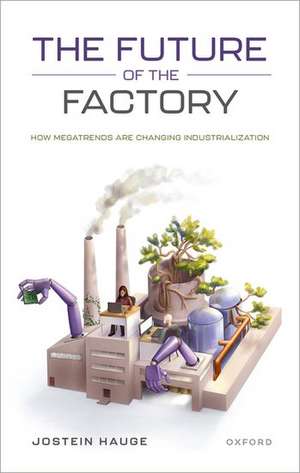The Future of the Factory: How Megatrends are Changing Industrialization
Autor Jostein Haugeen Limba Engleză Hardback – 26 sep 2023
Preț: 246.92 lei
Preț vechi: 273.56 lei
-10% Nou
Puncte Express: 370
Preț estimativ în valută:
47.25€ • 49.46$ • 39.09£
47.25€ • 49.46$ • 39.09£
Carte disponibilă
Livrare economică 04-10 martie
Livrare express 01-07 martie pentru 58.45 lei
Preluare comenzi: 021 569.72.76
Specificații
ISBN-13: 9780198861584
ISBN-10: 0198861583
Pagini: 240
Dimensiuni: 146 x 224 x 17 mm
Greutate: 0.43 kg
Editura: OUP OXFORD
Colecția OUP Oxford
Locul publicării:Oxford, United Kingdom
ISBN-10: 0198861583
Pagini: 240
Dimensiuni: 146 x 224 x 17 mm
Greutate: 0.43 kg
Editura: OUP OXFORD
Colecția OUP Oxford
Locul publicării:Oxford, United Kingdom
Recenzii
Factories and economic progress have been linked-for better and worse-since the Industrial Revolution. Modern factories are far removed from the grimy mills of the 19th century, but what is their 21st century future? In a compelling analysis, Jostein Hauge explores the massive economic transformations under way now to draw out lessons for countries contemplating a "post industrial" economy and for those yet to achieve industrialization.
The Future of the Factory presents new insights and critical issues surrounding industrialization and development. This novel contribution to the existing literature on industrial policy will stimulate debates on how these trends will evolve and shape the industrial revolution in the 21st century. The implications of these megatrends for developing countries are that industrialization and industrial policy, and developing technological capability, will remain central in the new changing landscape. Policymakers, business leaders, and scholars will benefit from reading this book.
In this book, Jostein Hauge shows how it is the factory, not the market, that has shaped the modern world. He then looks at how the factory-and thus our economic world-is currently being reshaped. In doing so, Hauge takes on the biggest challenges of our time-be they globalization or ecological breakdown-but is never swayed by hype. He questions even the most widely received wisdom but only when there is a firm empirical basis. He makes bold claims but never loses balance and realism. This is a gem of a book that will be an essential guide to understanding the future of the world economy.
The global economy has been fuelled by pervasive and uneven patterns of industrialization for more than two centuries. Jostein Hauge's new book reveals how significant new megatrends are reshaping both globalization and industrialization in the 21st century. The book is particularly insightful in offering critical assessments of topics like the impact of digital automation on production jobs, the rise of manufacturing-related services including artificial intelligence, and the dire planetary consequences of ecological breakdown if current development strategies are not fundamentally revamped. Written in an engaging style for a broad audience, this is a highly recommended and informative book that couldn't be more timely.
The book contains intellectual rigour and valuable economic discussion of the four megatrends that challenge the future of industrialisation. It is a useful resource for students, scholars, and policy-makers who are keen to understand the pressing issues in the world economy.
The Future of the Factory presents new insights and critical issues surrounding industrialization and development. This novel contribution to the existing literature on industrial policy will stimulate debates on how these trends will evolve and shape the industrial revolution in the 21st century. The implications of these megatrends for developing countries are that industrialization and industrial policy, and developing technological capability, will remain central in the new changing landscape. Policymakers, business leaders, and scholars will benefit from reading this book.
In this book, Jostein Hauge shows how it is the factory, not the market, that has shaped the modern world. He then looks at how the factory-and thus our economic world-is currently being reshaped. In doing so, Hauge takes on the biggest challenges of our time-be they globalization or ecological breakdown-but is never swayed by hype. He questions even the most widely received wisdom but only when there is a firm empirical basis. He makes bold claims but never loses balance and realism. This is a gem of a book that will be an essential guide to understanding the future of the world economy.
The global economy has been fuelled by pervasive and uneven patterns of industrialization for more than two centuries. Jostein Hauge's new book reveals how significant new megatrends are reshaping both globalization and industrialization in the 21st century. The book is particularly insightful in offering critical assessments of topics like the impact of digital automation on production jobs, the rise of manufacturing-related services including artificial intelligence, and the dire planetary consequences of ecological breakdown if current development strategies are not fundamentally revamped. Written in an engaging style for a broad audience, this is a highly recommended and informative book that couldn't be more timely.
The book contains intellectual rigour and valuable economic discussion of the four megatrends that challenge the future of industrialisation. It is a useful resource for students, scholars, and policy-makers who are keen to understand the pressing issues in the world economy.
Notă biografică
Jostein Hauge is a political economist and an Assistant Professor at the University of Cambridge, based at the Centre of Development Studies and the Department of Politics and International Studies. He is also a Fellow of Magdalene College. His research lies at the intersection of international political economy and development economics.
